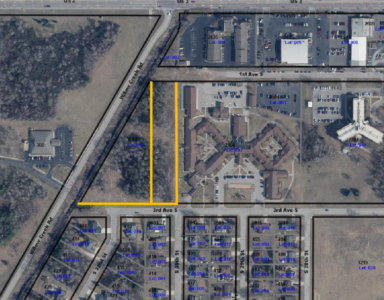Michigan House budget includes Copperwood Mine infrastructure monies
WAKEFIELD — Part of the budget that the Michigan House of Representatives approved last week includes $50 million to fund infrastructure for Gogebic County, which includes infrastructure for the controversial Copperwood Mine Project.
Copperwood is a copper sulfide mine being proposed by Highland Copper, a Canadian company. The $50 million in funding stems from an approval of a legislatively directed spending item sponsored by state Rep. Greg Markkanen, R-Hancock, and cosponsored by Rep. Dave Prestin, R-Cedar River, and Rep. Karl Bohnak, R-Deerton. The Mining Journal previously covered a story regarding testimony in support of this grant request by western Upper Peninsula leaders and representatives in its Aug. 2 edition.
“House includes $50.0 million GF/GP (one-time) for Wakefield Township for infrastructure improvements that include transportation access, water and wastewater, groundwater quality analysis, power reliability, and cellular and broadband access,” reads the line item in the proposed House substitute to House Bill 4706 (H-1) which was approved by the Michigan House last week. The entire budget in detail can be accessed online at legislature.mi.gov/documents/2025-2026/billanalysis/House/pdf/.
“This funding request for Wakefield Township is to support crucial infrastructure for site readiness purposes that are necessary for the Township to pursue economic development opportunities. Site readiness, or lack thereof, is commonly cited as a factor in investment decisions by businesses and venture funds considering Michigan-based opportunities,” Markkanen’s Appropriations Request for Legislatively-Directed Spending Items reads when describing the purpose of the funding request, which was filed on April 22. “An opportunity before the Township offers a generational opportunity to create hundreds of good-paying jobs to support local families and bolster the national supply chain and defense capabilities. However, site investment is needed to encourage investment in the Appropriations Requests for Legislatively Directed Spending Items area.”
The full Appropriations Request can be viewed online at house.mi.gov/LegislativelyDirectedSpendingItems.
Opponents of the Copperwood Mine Project are concerned by the environmental impacts that the mine would have on the area’s natural resources, and are critical of the use of taxpayer money to fund the infrastructure from a company that has never operated a mine before the Copperwood proposal.
A joint press release from Jane Fitkin, a Marquette resident and director of Citizens for a Safe & Clean Lake Superior, and Tom Grotewohl, a Wakefield Township resident and founder of Protect the Porkies, cited that the proposed mine’s average ore grade of 1.5% would “… leave over 30 million tons of toxic mine waste perched precariously within two miles of Lake Superior, and within a stone’s throw of beloved Porcupine Mountains State Park and the North Country Trail.”
“For a budget claiming to eliminate fraud, waste and abuse from our state’s spending, the inclusion of $50 million to advance the Copperwood Mine is a slap in the face to Michiganders and our legislative system,” Fitkin said in a news release Thursday. “If this project is to move forward, it must be on the shoulders of private investors as every other Michigan mine has done, not footed by our taxpayers.”
According to the release, the Copperwood Mine would not produce refined copper, which is included on a new draft of the critical minerals list released by the U.S. Geological Survey last Monday. Rather, the mine would produce a low, non-saleable ore grade, which the USGS considers to be “mined” copper rather than “refined” copper. Additionally, it says that “mined” copper is considered to be at a “negative” risk of supply shortages.
“Silicon metal and mined copper have negative probability-weighted net decreases in (the) U.S. GDP but are still recommended for inclusion because of the risks associated with other stages of their supply chains, namely silicon ferroalloys and refined copper,” reads the Methodology and Technical Input information for the 2025 U.S. List of Critical Minerals. The full report can be viewed online at pubs.usgs.gov/publication/ofr20251047.
The release also says that the Copperwood Mine plans to ship that ore to Canada or potentially further to be smelted into “refined” copper with no guarantee of its return to Michigan or the United States. “Given the limited copper processing capacity in the U.S., the concentrate may be sent to Canada for processing. However, ownership of the copper does not transfer at that stage. Copperwood Resources Inc, a U.S. company, will independently determine the end customer, ideally a Michigan-based industry,” writes Copperwood under the frequently-asked-questions portion of their website.
“Funding the infrastructure to accelerate an inexperienced Canadian company’s first ever mine at the worst spot imaginable is neither Pure nor Michigan,” Grotewohl said in the joint press release. “Make no mistake, this funding request is identical in purpose to the $50 million Michigan Strategic Fund-approved SOAR grant twice halted last year due to pushback from around the state and nation. Considering Speaker Matt Hall’s commitment to transparency, it’s surprising that he and his colleagues would include a corporate welfare handout thinly veiled as a community infrastructure grant to Wakefield Township.”
Now that a version of the budget has been passed by the House, negotiations are currently ongoing between the Michigan House and Senate leadership to agree on a final budget before the Oct. 1 deadline. If they fail to do so, it could force a government shutdown.
More information about the Copperwood Project can be found online at copperwoodproject.com. More information about Protect the Porkies and Citizens for a Safe & Clean Lake Superior can be found on their respective websites at protecttheporkies.com/home and citizensforsuperior.org.
Abby LaForest can be reached at 906-228-2500, ext. 548, or alaforest@miningjournal.net.






